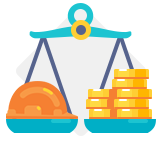Starting a business is never easy. About one-fifth of all startups typically don’t survive past year one of operation, according to the U.S. Bureau of Labor Statistics, and nearly half never make it to their fifth anniversary. Staying afloat is difficult under normal conditions, and even more so when dealing with high inflation and labor shortages.
Outside of the currently difficult economic conditions, there are plenty of other reasons that startups fail, with a “bad location” being among the most common. Choosing the right state for a business is therefore crucial to its success. A state that provides the ideal conditions for business creation — access to cash, skilled workers and affordable office space, for instance — can help new ventures not only take off but also thrive.
In this study, WalletHub compared the 50 states across 25 key indicators of startup success to determine the most fertile grounds in which to launch and grow an enterprise.

Chip Lupo, WalletHub Analyst
Main Findings
Best States to Start a Business
|
Overall Rank |
State |
Total Score |
Business Environment Rank |
Access to Resources Rank |
Business Costs Rank |
|---|---|---|---|---|---|
| 1 | Florida | 59.66 | 1 | 14 | 28 |
| 2 | Georgia | 58.62 | 2 | 27 | 16 |
| 3 | Utah | 57.84 | 11 | 2 | 29 |
| 4 | Texas | 56.28 | 3 | 12 | 34 |
| 5 | Idaho | 56.02 | 8 | 16 | 11 |
| 6 | Oklahoma | 55.17 | 16 | 28 | 2 |
| 7 | Nevada | 54.03 | 13 | 11 | 21 |
| 8 | Colorado | 53.98 | 5 | 10 | 31 |
| 9 | Arizona | 53.46 | 4 | 36 | 30 |
| 10 | Kentucky | 53.36 | 20 | 22 | 4 |
| 11 | Arkansas | 53.29 | 15 | 26 | 6 |
| 12 | Tennessee | 53.23 | 6 | 30 | 27 |
| 13 | South Carolina | 53.15 | 10 | 35 | 10 |
| 14 | Mississippi | 52.59 | 26 | 37 | 1 |
| 15 | North Carolina | 52.32 | 9 | 32 | 20 |
| 16 | Montana | 52.08 | 12 | 41 | 8 |
| 17 | Alabama | 52.07 | 18 | 39 | 5 |
| 18 | California | 51.42 | 7 | 1 | 49 |
| 19 | Indiana | 50.22 | 30 | 21 | 7 |
| 20 | Louisiana | 48.76 | 25 | 31 | 17 |
| 21 | Illinois | 48.17 | 39 | 3 | 35 |
| 22 | Michigan | 48.10 | 33 | 18 | 18 |
| 23 | Maine | 48.04 | 14 | 44 | 25 |
| 24 | Nebraska | 47.70 | 32 | 19 | 24 |
| 25 | Washington | 47.59 | 22 | 6 | 41 |
| 26 | Ohio | 47.47 | 36 | 23 | 15 |
| 27 | New Mexico | 47.36 | 34 | 38 | 9 |
| 28 | South Dakota | 47.13 | 37 | 47 | 3 |
| 29 | Minnesota | 46.88 | 35 | 9 | 32 |
| 30 | Kansas | 46.73 | 41 | 25 | 12 |
| 31 | Wyoming | 46.60 | 21 | 46 | 23 |
| 32 | North Dakota | 45.74 | 23 | 43 | 22 |
| 33 | Massachusetts | 45.55 | 29 | 4 | 44 |
| 34 | Missouri | 45.17 | 46 | 20 | 19 |
| 35 | Wisconsin | 45.01 | 47 | 15 | 26 |
| 36 | Iowa | 44.98 | 45 | 29 | 14 |
| 37 | Delaware | 44.78 | 27 | 7 | 43 |
| 38 | Virginia | 43.05 | 24 | 34 | 37 |
| 39 | Oregon | 41.52 | 31 | 24 | 39 |
| 40 | New York | 41.25 | 40 | 5 | 48 |
| 41 | West Virginia | 40.43 | 48 | 50 | 13 |
| 42 | Vermont | 39.91 | 42 | 42 | 33 |
| 43 | Pennsylvania | 39.29 | 44 | 33 | 38 |
| 44 | Hawaii | 39.20 | 19 | 49 | 42 |
| 45 | New Hampshire | 39.02 | 38 | 45 | 36 |
| 46 | Maryland | 38.93 | 28 | 17 | 47 |
| 47 | Alaska | 38.37 | 17 | 48 | 45 |
| 48 | New Jersey | 37.36 | 43 | 8 | 50 |
| 49 | Connecticut | 34.63 | 49 | 13 | 46 |
| 50 | Rhode Island | 33.51 | 50 | 40 | 40 |
Note: With the exception of “Total Score,” all of the columns in the table above depict the relative rank of that state, where a rank of 1 represents the best conditions for that metric category.

- Highest
- 1. Idaho
- 2. Utah
- 3. Nevada
- 4. Florida
- 5. Delaware

- Lowest
- 46. Connecticut
- 47. New York
- 48. Vermont
- 49. West Virginia
- 50. Missouri

- Most
- T-1. North Dakota
- T-1. Utah
- T-1. South Dakota
- T-1. Iowa
- T-1. Nebraska

- Least
- 46. Rhode Island
- 47. California
- 48. Florida
- 49. Delaware
- 50. Arizona

- Lowest
- 1. Mississippi
- 2. West Virginia
- 3. Arkansas
- 4. Louisiana
- 5. New Mexico

- Highest
- 46. California
- 47. Hawaii
- 48. Massachusetts
- 49. New Jersey
- 50. Maryland

- Highest
- 1. Illinois
- 2. Nevada
- 3. California
- 4. New Jersey
- 5. Washington

- Lowest
- 46. Maine
- 47. South Dakota
- 48. North Dakota
- 49. New Hampshire
- 50. Vermont

- Longest
- 1. Alaska
- T-2. Texas
- T-2. Wyoming
- T-4. Louisiana
- T-4. North Dakota
- T-4. South Dakota

- Shortest
- T-45. Connecticut
- T-45. Massachusetts
- 47. Oregon
- 48. Rhode Island
- 49. Vermont
- 50. Utah

- Cheapest
- 1. Iowa
- 2. Maine
- 3. South Dakota
- 4. Montana
- 5. Minnesota

- Most Expensive
- 45. New Jersey
- 46. Maryland
- T-47. California
- T-47. Alaska
- T-47. New York

- Most
- 1. Massachusetts
- 2. Colorado
- 3. New Jersey
- 4. Maryland
- 5. Vermont

- Least
- 46. Kentucky
- 47. Louisiana
- 48. Arkansas
- 49. Mississippi
- 50. West Virginia
In-Depth Look at the Best States to Start a Business
Florida
Florida is the best state for starting a business in 2025, boasting the second-most startups per capita and the highest percentage of adults who engage in entrepreneurship. The number of small businesses in the state grew by nearly 16% between 2016 and 2022, the fourth-highest percentage in the country.
There are plenty of good reasons why so many people start businesses in Florida, including the fact that it has the 11th-highest business revenue growth rate and the tenth-lowest corporate taxes.
Given the prevalence of retirees in Florida, you might assume the labor force is dwindling, but the opposite is true. In fact, the working-age population (age 16-64) is growing faster in Florida than in all but six other states. Plus, Florida has the third-highest percentage of workers who say they are enthusiastic about and committed to their work.
Georgia
The second-best state for starting a business is Georgia, which has the third-highest entrepreneurship rate in the country. There’s great growth potential, too, as the state has the sixth-highest growth rate for business revenues.
Georgia also has the second-highest share of businesses that are in “strong clusters,” at over 61%. Clusters are interconnected businesses that specialize in the same field, and “strong clusters” are ones that are in the top 25% of all regions for their particular specialization. If businesses fit into one of these clusters, they will have an easier time getting the materials they need, and can tap into an existing customer base. To some degree, it might mean more competition, though.
Business owners in Georgia get a break when it comes to taxes, too, as they are subject to the eighth-lowest corporate tax rate in the country. Plus, the state has the 10th-lowest overall cost of living and the fifth-shortest average work week.
Utah
Utah is the third-best state for starting a business, in large part because it’s the second-easiest state for securing financing for business loans, and it has the third-largest year-over-year employment growth in the country, at 2%. Having the necessary capital makes it much easier for a business to get off the ground, and a strong job growth rate indicates that existing businesses are doing well. Business owners in Utah also save money on employee benefits, as the average health insurance premium per enrolled employee is the third-lowest in the nation.
In addition, Utah was recognized as one of the best states on the “Digital States Survey” from the Center for Digital Government, which measures how well states are using technology to improve the efficiency of their businesses. Tech-savvy Utahans should be able to capitalize on their skillset and access to good technology to help their businesses thrive.
Ask the Experts
National and state economic policies can greatly affect business creation and the direction they take after launching. For insight into the ways in which different measures impact business, we asked a panel of experts to address the following key questions:
- Do you believe that our current economic policies promote new business development?
- To what extent do state policies, such as corporate tax rates, influence decisions about whether and where to start a new business?
- Are tax breaks and other incentives to encourage new businesses on net a good or bad investment for states?
- Which, in your opinion, are the best industries for starting a business in 2025, and what states are most likely to see an increase in start-ups activity?
- What measures can state authorities undertake in order to encourage entrepreneurs to start new businesses in their state?
Ask the Experts
Manager of Operations, John P. Lowth Entrepreneurship Center – The University of Tampa
Read More
Ph.D. – Associate Professor, Department of Management and Marketing, College of Business – Texas A&M University - San Antonio
Read More
Ed.D. – Associate Professor of Instruction; Academic Director of the Business Management BBA Program, Department of Management, Fox School of Business – Temple University
Read More
Professor of Entrepreneurship and Director, Small Business Institute (SBI), Founder and Executive Director, Center for Entrepreneurial Studies, Dean of Fellows, Small Business Institute Association, Norm Brodsky College of Business – Rider University
Read More
Professor of Economics and History – Eastern Florida State College
Read More
Professor of Finance – Menlo College
Read More
Methodology
In order to determine the best and worst states to start a business, WalletHub compared the 50 states across three key dimensions: 1) Business Environment, 2) Access to Resources and 3) Business Costs.
We evaluated those dimensions using 25 relevant metrics, which are listed below with their corresponding weights. Each metric was graded on a 100-point scale, with a score of 100 representing the most favorable conditions for new-business creation.
Finally, we determined each state’s weighted average across all metrics to calculate its overall score and used the resulting scores to rank-order our sample.
Business Environment – Total Points: 50
- Average Length of Work Week (in Hours): Double Weight (~5.88 Points)
- Share of Engaged Workers: Double Weight (~5.88 Points)
Note: This metric is based on Gallup’s “State of the American Workplace” report. Gallup defines engaged employees as those who are involved in, enthusiastic about and committed to their work and workplace. - Growth in Number of Small Businesses: Full Weight (~2.94 Points)
- Startups per Capita: Full Weight (~2.94 Points)
- Growth of Average Business Revenues: Double Weight (~5.88 Points)
- Five-Year Business Survival Rate: Full Weight (~2.94 Points)
- Industry Variety: Full Weight (~2.94 Points)
- Industry-Cluster Strength: Full Weight (~2.94 Points)
Note: This metric is based on data from the U.S. Cluster Mapping Project. “Industry-Cluster Strength” refers to the level of high employment specialization of a cluster, which is defined by the U.S. Cluster Mapping Project as a “regional concentration of related industries in a particular location.” - Entrepreneurship Index: Double Weight (~5.88 Points)
- Share of Fast-Growing Firms: Full Weight (~2.94 Points)
Note: This metric measures the number of firms in each state that are included on the “Technology Fast 500” list (Deloitte report) as a share of total firms in each state. - “Digital States” Survey Grade: Full Weight (~2.94 Points)
- Job Growth (2024 vs. 2019): Full Weight (~2.94 Points)
- GDP Growth (2023 vs. 2022): Full Weight (~2.94 Points)
Access to Resources – Total Points: 25
- Financing Accessibility: Full Weight (~3.57 Points)
Note: This metric was calculated as follows: Total Annual Value of Small-Business Loans / Total Number of Small Businesses. - Venture Investment Amount per Capita: Full Weight (~3.57 Points)
- Human-Capital Availability: Double Weight (~7.14 Points)
Note: This metric was calculated as follows: Number of Job Openings per Number of Civilians in Labor Force – Unemployment Rate. - Higher-Education Assets: Full Weight (~3.57 Points)
Note: This is based on WalletHub’s “Best Universities Ranking” report. - Share of College-Educated Population: Full Weight (~3.57 Points)
Note: This metric measures the share of the population aged 25 and older with a bachelor’s degree or higher. - Working-Age Population Growth: Full Weight (~3.57 Points)
Note: “Working-Age Population” includes individuals aged 16 to 64.
Business Costs – Total Points: 25
- Office-Space Affordability: Double Weight (~6.25 Points)
Note: This metric measures the per-square-foot cost of commercial office space. - Labor Costs: Double Weight (~6.25 Points)
Note: This metric measures the median annual income of the state. - Average Annual Single Insurance Premium per Enrolled Employee: Full Weight (~3.13 Points)
Note: This metric refers to employer-based health insurance. - Corporate Taxes: Full Weight (~3.13 Points)
- Total Effective State & Local Tax Rates on Mature Corporate Headquarters: Full Weight (~3.13 Points)
- Cost of Living: Full Weight (~3.13 Points)
Sources: Data used to create this ranking were collected as of September 19, 2024 from the U.S. Census Bureau, Bureau of Labor Statistics, Ewing Marion Kauffman Foundation, Center for Digital Government, National Venture Capital Association, Indeed.com, Tax Foundation, U.S. Cluster Mapping Project, Deloitte, Gallup, U.S. Bureau of Economic Analysis, Council for Community and Economic Research, LoopNet, Federal Deposit Insurance Corporation, Kaiser Family Foundation and WalletHub research.








WalletHub experts are widely quoted. Contact our media team to schedule an interview.